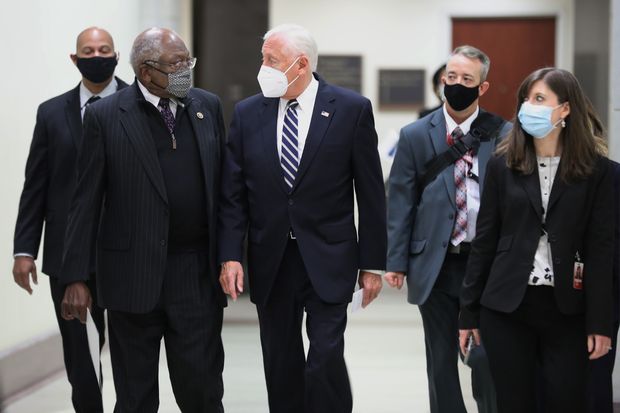
House Majority Leader Steny Hoyer, center, and Majority Whip James Clyburn, second from left, head for a news conference at the U.S. Capitol on Nov. 18.
Getty Images
After months of holding out for a larger package, Democratic congressional leaders threw their weight behind a coronavirus fiscal-stimulus proposal that has bipartisan support in both chambers of Congress on Wednesday.
The endorsement, announced in a joint statement by House Speaker Nancy Pelosi and Senate Democratic Leader Chuck Schumer, could get stalled talks unstuck as the leaders say they want to be able to send lawmakers home by the end of next week for the end-of-year holidays.
“While we made a new offer to Leader McConnell and Leader McCarthy on Monday, in the spirit of compromise we believe the bipartisan framework introduced by senators yesterday should be used as the basis for immediate bipartisan, bicameral negotiations,” the pair wrote.
“Of course, we and others will offer improvements, but the need to act is immediate and we believe that with good-faith negotiations we could come to an agreement.”
Prior to the election, Democrats insisted on a $2.2 trillion package, a size Senate Majority Leader Mitch McConnell said was well beyond what was needed. A group of lawmakers from both parties in the House and Senate unveiled a package they said totaled a bit more than $900 billion. McConnell proposed a smaller package that he said could be signed into law by President Donald Trump.
The bipartisan package was put together by the House Problem Solvers Caucus, a 50-member group evenly divided by party, and a group of nine senators that included Democrats, Republicans and an independent. The package would allocate about two-thirds of its aid for more Paycheck Protection Program funds, additional unemployment benefits and assistance for state, local and tribal governments.
A request to McConnell’s office for comment on the endorsement was not immediately returned.
The move came after Pelosi’s second-in-command, House Majority Leader Steny Hoyer, said Wednesday he hopes to see a deal worked out in principle as soon as this weekend.
Hoyer told reporters he had talked with McConnell about the time frame.
“He and I both agreed that it would be optimal if in fact we get to agreement by the end of this weekend, have that agreement put on paper and memorialized so that we can consider it as early as Wednesday or Thursday of next week,” Hoyer said on a conference call with reporters.
After months of negotiations leading up to the Nov. 3 election failed to yield a deal, Hoyer’s timeline sounds optimistic, a point he conceded. But he said the driving force is to allow lawmakers to get home for the holidays with enough time to quarantine if necessary ahead of the Christmas break and visit family safely.
Even if lawmakers wanted to stick around a little later to press their demands, Hoyer said he and McConnell were in agreement. “There’s no magic about another week and he agreed on that,” he said.
Hoyer said even if a deal is passed next week, it would not necessarily be the end of federal help for the economy, and he anticipated revisiting the issue in 2021 after Joe Biden enters the White House.
“I don’t know that any of us believe that if we pass something next week that gives relief to all the people I just mentioned, that it will be the last piece of COVID-19 legislation,” he said.











